 |
 |
 |
| |
Only Half of MSM With HIV Getting Screened for Anal Cancer
|
| |
| |
IDWeek 2023, October 11-15, 2023, Boston
Mark Mascolini
Only about half of HIV-positive men who have sex with men (MSM) attending an academic HIV clinic with an anal cancer screening program got screened with an anal PAP test or high-resolution anoscopy (HRA) through 5 years of follow-up [1]. This 432-man retrospective study also found that some MSM with higher risk of anal cancer were less likely to get screened for squamous cell carcinoma of the anus (SCCA). And anal PAP testing seemed blind to high-grade anal lesions.
Yale School of Medicine researchers who conducted this study noted that MSM with HIV run nearly an 80 times higher risk of SCCA than men in the general population. The recently concluded ANCHOR trial determined that treating anal high-grade squamous intraepithelial lesions diagnosed by HRA lowers the rate of SCCA diagnoses in MSM with HIV [2]. But how to screen for SCCA in this population remains unclear.
The Yale group offers annual anal cytology (a PAP smear) to MSM with HIV to screen for SCCA. Men with an abnormal PAP result (atypical squamous cells of undetermined significance or anal intraepithelial neoplasia [AIN] grade 1 to 3) got referred to a colorectal surgeon for HRA and treatment of dysplasia.
The Yale investigators conducted this retrospective analysis of MSM with HIV to gauge uptake of annual PAP test screening leading to HRA over a 5-year period (2018-2022). They also wanted to identify traits of men who did not get screened for SCCA and to describe the real-world performance of the PAP test in MSM with HIV.
The study focused on 432 men at least 35 years old who had at least one clinic visit by the last day of 2019 at one of two academic center HIV clinics. Median age at study entry stood at 57, 97% of men were taking antiretroviral therapy at their last visit, and 90% had a viral load below 200 copies. Almost two thirds of the group, 62%, had a history of smoking cigarettes, and 57% had an anal PAP test before 2018.
Through a median 4 years of follow-up, almost 50% of these HIV-positive MSM never got screened for SCCA, and only one quarter had two or more SCCA screening tests. The 219 men who did get screened had a median of 2 screens during follow-up.
In the whole study group, 50.7% had at least one PAP or HRA since 2018, only 26.2% had at least two PAP or HRA tests since 2018, and only 13.2% had at least three PAP or HRA screens since 2018. Those cascade percentages proved a little lower among men 55 or older: 45.7% with at least one PAP or HRA since 2018, 25.4% with at least two PAP or HRA tests since 2018, and 10.9% with at least three PAP or HRA tests since 2018.
Logistic regression identified three independent predictors of not getting anal screening: (1) older age: 57-61 vs under 47, adjusted odds ratio (aOR) 2.13, 95% confidence interval (CI) 1.19 to 3.98; 62 or older vs under 47, aOR 2.18, 95% CI 1.2 to 3.98 (P = 0.019 for age comparisons); (2) history of smoking, aOR 2.1, 95% CI 1.34 to 3.20 (P = 0.001); (3) history of anal dysplasia before 2018, aOR 0.21, 95% CI 0.12 to 0.35 (P < 0.001). In this analysis race and using Medicare or Medicaid did not predict who would not get screened.
Among 365 PAP tests done during the 2018-2022 study window, cytologists rated 17.5% of them unsatisfactory, 55.6% as negative, 17.5% as atypical squamous cells of undetermined significance (ASCUS), 9.4% as AIN grade 1, and 0% as AIN 2 or AIN 3. Among 112 HRA tests done, cytologists rated 28.5% negative, 18.7% AIN 1, and 53.5% AIN 2 or AIN 3. The researchers point out that anal PAP saw no AIN 2 or AIN 3, while HRA rated more than half of tests AIN 2 or AIN 3.
The Yale investigators stressed that only about half of HIV-positive MSM, who run an 80-fold greater risk of SCCA than the general population, got screened for SCCA through 5 years of follow-up-even though they got their HIV care at an academic center with an active SCCA screening program. Ironically, some groups with a higher risk of SCCA-older men and those with a smoking history-had lower odds of getting screened for SCCA.
The research team believes "anal PAP is a challenging test to administer as a screening test in [the] real world," pointing out that half of the results were rated "unsatisfactory" and that PAP had low sensitivity for high-grade lesions. They concluded that "better SCCA screening tests and implementation models are urgently needed."
References
1. Achhra A, Chan E, Applebaum S, et al. Evaluation of anal cancer screening program in men who have sex with men (MSM) persons with HIV (PWH) at two academic center HIV clinics 2018-2022. IDWeek 2023, October 11-15, 2023, Boston.
2. Palefsky JM, Lee JY, Jay N, et al; ANCHOR Investigators Group. Treatment of anal high-grade squamous intraepithelial lesions to prevent anal cancer. N Engl J Med. 2022;386:2273-2282. doi: 10.1056/NEJMoa2201048. https://www.nejm.org/doi/10.1056/NEJMoa2201048
Evaluation Of Anal Cancer Screening Program in Men Who Have Sex With Men (MSM) Persons With HIV (PWH) At Two Academic Center HIV Clinics 2018-2022
Amit Achhra1, Elizabeth Chan1, Serina Applebaum1, Maggie Guerrero2, Ritche Hao1, Haddon Pantel2, Michael Virata1, Margaret Fikrig1 and Lydia Barakat1
1Section of Infectious Diseases, Dept of Medicine, and 2 Colon and rectal surgery, Dept of Surgery,
Yale School of Medicine, New Haven, CT, USA
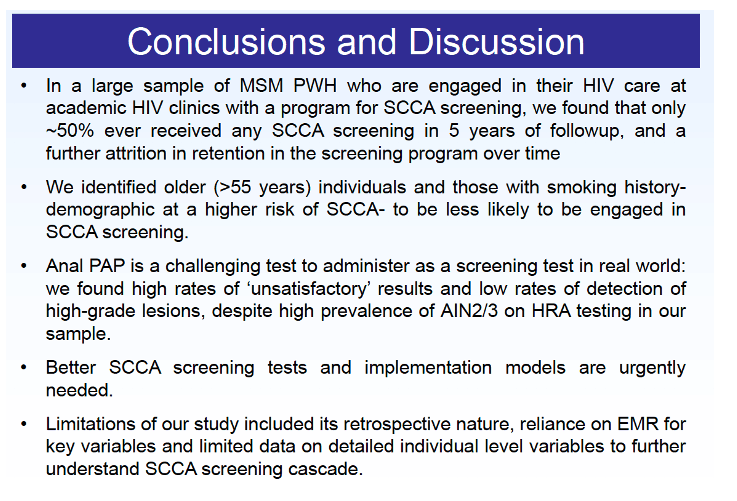
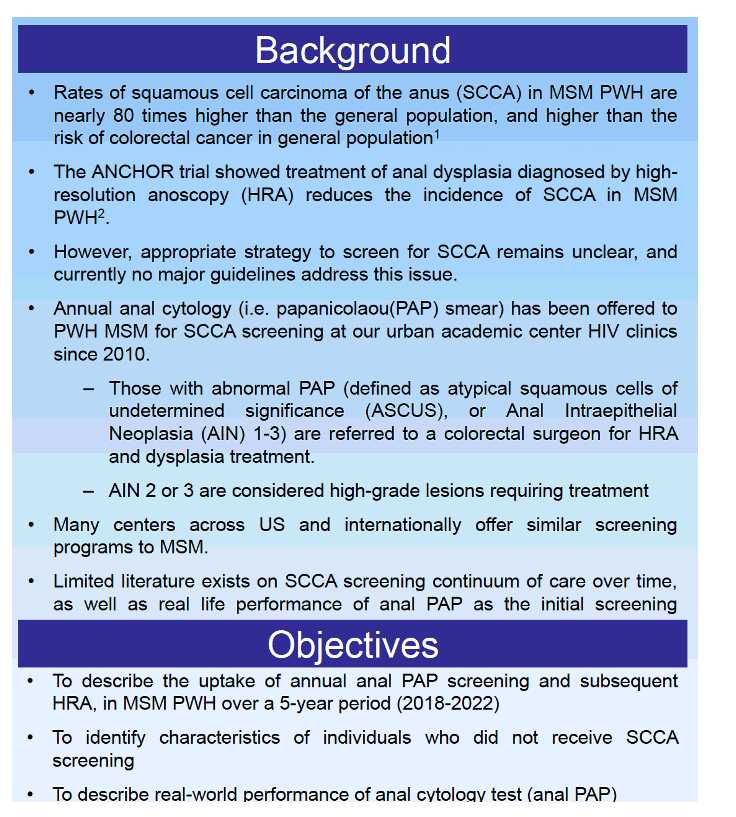
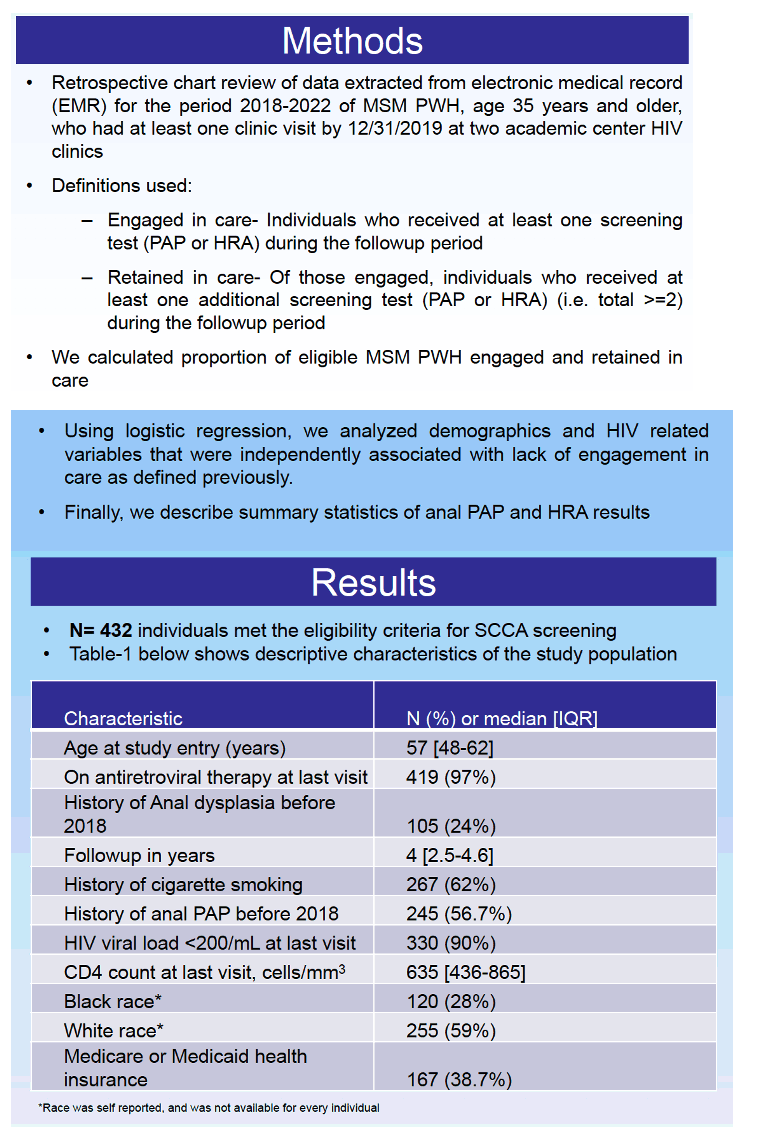
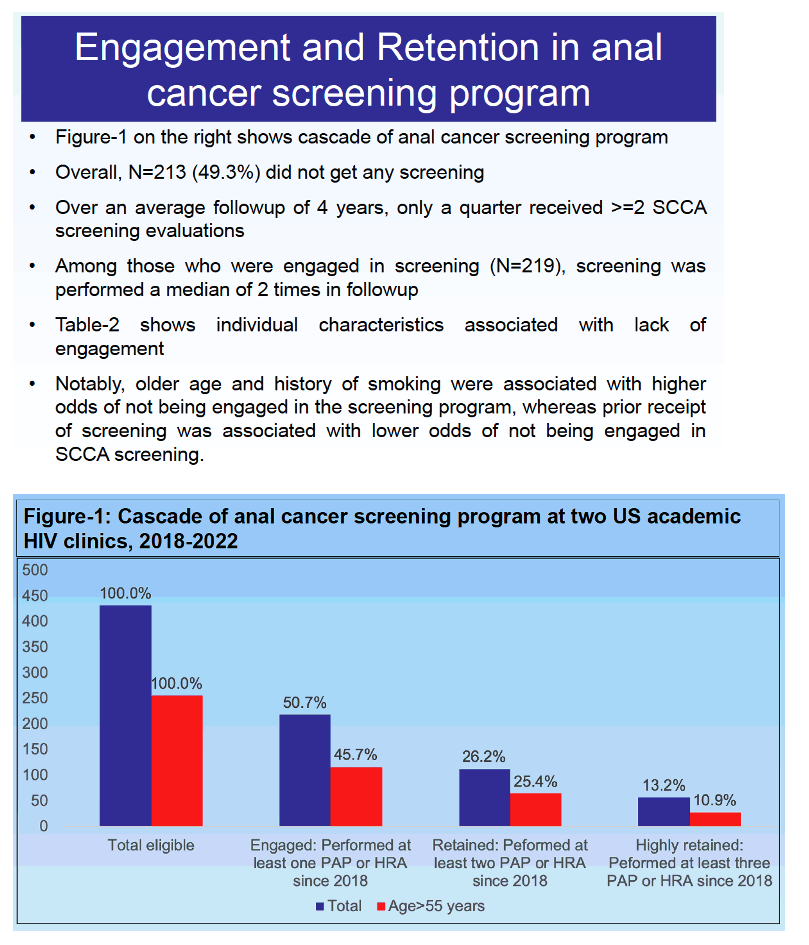
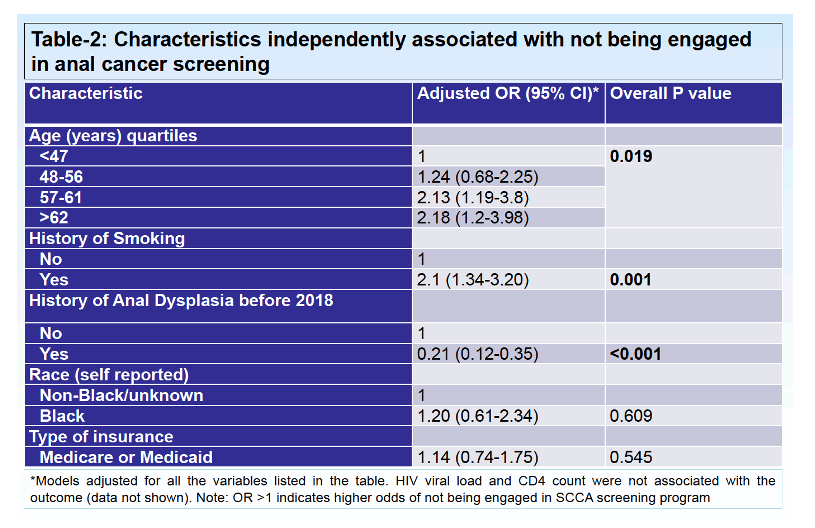
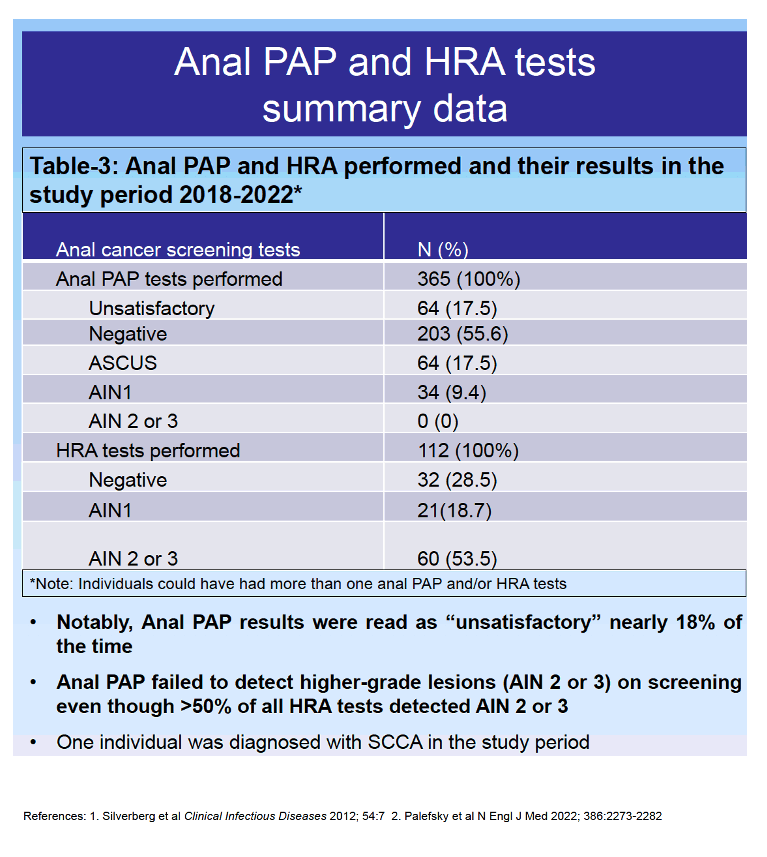
|
| |
|
 |
 |
|
|